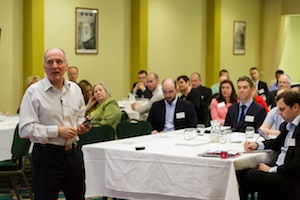 Last year the team behind Yes Telecom's success reunited to launch Zest4, a fast expanding company with big ambitions to take partners on a growth journey in the UC space. Here's their story...
Last year the team behind Yes Telecom's success reunited to launch Zest4, a fast expanding company with big ambitions to take partners on a growth journey in the UC space. Here's their story...
Familiar faces include CEO Freddie Fazelynia, Finance Director Kevan Wakerley, Operations Director Mandy Fazelynia, Head of Channel Sales Rob Foster, and Head of Hosted Solutions Keith McBride. They established Zest4 (the trading name of All Communications) in late 2012 and began trading in April 2013. "During our planning stages we spent time deliberating what our model should look like," explained Freddie Fazelynia.
"We discounted the time and resource consuming data centre and cloud technology model, and decided to get our channel management in shape. The best way to do this was to start with what we knew best which was mobile and connectivity solutions, delivering these for mobile dealers and resellers, fixed line resellers and a handful of IT specialists. Later in the year we started selling telephony systems both traditional and hosted."
From a standing start in April 2013 the company now boasts over 4,000 mobile subscribers of which 15 per cent also take connectivity. "Our customer base and associated revenues have grown slowly but steadily over the last 10 months and we have been choosy about the type of business we take on," added Wakerley. "Not only do we assess revenue and margin but the propensity of a customer to take additional products in the short to medium term is paramount. Our revenues are healthy and we believe they are more than 50 per cent higher per user than the industry average."
The company's annualised revenues currently stand at £2.5 million with a target to hit £5 million by the end of the year. "At the start of 2015 we expect all our revenue streams to be active, our infrastructures bedded down and our expertise firmly in place," said Wakerley. "We will then be in a position to scale with minimal risk and anticipate exceeding our target revenue of £21 million. Our customer base will vary in size and while we will support solutions for all sizes of business our target market is SoHo and SME with up to 250 employees. We expect our average customer size to be in the 12-20 bracket."
Zest4's headcount is set to double from 19 over the coming months and will reach 75 by December 2015, noted Wakerley. "Staff requirements are much lower than we have had in previous businesses but with the development of portals and self-care and the channel doing much of the first line customer support, there is no need for excessive numbers," he added.
A big priority is to develop the product portfolio in order to become a true digital telco, explained Foster. "We are currently working with channel partners providing both Vodafone and O2 mobile, along with fixed line and hosted telephony solutions," he commented. "Shortly we will be adding cloud-based products including Office 365, Lync and Sharepoint. These products, combined with the ability to provide connectivity and devices with leasing options available for the SME market, will be beneficial for channel partners from mobile, fixed line and IT backgrounds to increase revenue and move into the digital space."
Mandy Fazelynia noted that it was always the company's intention to be a provider of UC solutions and digital experiences. "The opportunity in converting traditional PBX to VoIP solutions has been a key focus for us and we have built a solution for our channel partners to enable them to uncover opportunities in this space," she said. "The impact of 4G and the growing popularity of smartphone and tablet devices will transform the way businesses communicate. Whether through email or messaging communication, accessing and sharing data or plain voice conversations, mobility is key in this changing world."
The uptake of cloud-based products and the potential to link products with cloud and connectivity is Zest4's primary focus and the firm is aligning its portfolio and back office operations to meet the demand in this area. "Growth in the M2M market is also a key influence on our strategy and we have recently contracted to be Telefonica O2's first M2M Wholesale partner," added Mandy Fazelynia.
"We will be supporting our partners in uncovering and providing M2M solutions and enabling them to dual brand bill these solutions as opposed to introducing the customer and then having no further involvement."
The uptake and future potential of VoIP is also a key growth area, pointed out McBride. "Looking at one experience across all devices is another area of focus for Zest4 and something that the SME market is encouraging conversations about," he added. "The business benefits of cloud-based services such as Office 365, Lync and Sharepoint are enabling businesses to work more efficiently, from anywhere at any time on any device. Work is fast becoming a 'thing you do' and not just a 'place you go to' and our focus is on providing solutions that enable businesses to evolve with a flexible working policy."
The challenge, noted Foster, is in evolving and enabling partners to have different conversations with their customers that will open up the opportunity to provide UC solutions. "It is imperative that we work with the right partners and ensure their business models change," he said. "We are addressing this by providing the tools to enable our partners to gain knowledge and experience with new products, uncover opportunities, engage with their customers effectively and provide solutions together with Zest4."
The Zest4 channel proposition operates under both dealer and reseller models. The current proposition includes mobile, fixed, data and hosted products supplied wholesale from O2, Vodafone, Gamma, M247 and Outsourcery. "Our aims are to recruit and work with more channel partners that currently operate in the IT or fixed space who have a desire to expand their knowledge in providing UC solutions," said Mandy Fazelynia. "We are also looking to recruit mobile dealers and resellers who are ready to make the transition into UC and are looking for support to get them into this space."
The Partner Portal makes doing business efficient, and after sales support ensures that churn stays low, according to Mandy Fazelynia. "The Zest4 Training Academy can be accessed by our partners to train their teams on the full product range," she said. "And our marketing team assist in putting together campaigns, opening up conversations and pitching the proposition. Resellers have an opportunity to work across all markets and become UC consultants for their customers. Continuing to specialise in one service in isolation is no longer an option and not a good strategy for customer retention."
The UC market will become more competitive and customers' requirements more demanding. "Those parties who can meet these demands and become knowledgeable across a range of products and who can differentiate themselves from the majority will be the ones who succeed," she added. "Those who are unable to evolve in this way will ultimately fail."
The firm plans to provide additional cloud services including Dynamics, file storage and application development. "Because Zest4 is new we have no legacy or baggage to hold us back," said Mandy Fazelynia. "Growth is driven by forming strong relationships, understanding our partners' business and working with them closely to support and enable their growth plans and transition them into selling a wider product portfolio."
However, growth for growth's sake is not an option, noted Wakerley. "We want to retain our culture and be in control of our own destiny," he said. "We have learned this from past mistakes. Our culture is the most important aspect of our business and is the glue which holds everything else together. The people we have and the people we recruit in the future determine this culture of staff retention and development. Although a new company, we will leverage the values that made Yes Telecom a success, and our culture will reflect our past winning formula."•
Pictured above: The Zest4 management team

 Gamma welcomed an intake of 350 channel partners during its 2014 university themed roadshow. The Universities UK tour visited Heriot-Watt University in Edinburgh, The University of Manchester, Keele University and Imperial College London.
Gamma welcomed an intake of 350 channel partners during its 2014 university themed roadshow. The Universities UK tour visited Heriot-Watt University in Edinburgh, The University of Manchester, Keele University and Imperial College London. Hosted UC specialist thevoicefactory is in full production mode according to Sales Director Paul Harrison who has manufactured a strong pedigree in advancing the market for hosted solutions.
Hosted UC specialist thevoicefactory is in full production mode according to Sales Director Paul Harrison who has manufactured a strong pedigree in advancing the market for hosted solutions. Last year the team behind Yes Telecom's success reunited to launch Zest4, a fast expanding company with big ambitions to take partners on a growth journey in the UC space. Here's their story...
Last year the team behind Yes Telecom's success reunited to launch Zest4, a fast expanding company with big ambitions to take partners on a growth journey in the UC space. Here's their story...